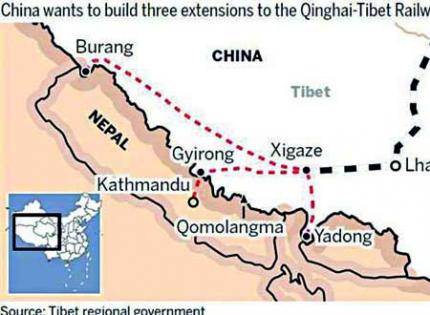With the Centre’s rail and road connectivity plans for the Sino-India border areas still on the drawing board, Chinese trains, traversing the lofty Himalayas, will almost touch the Indian border in less than 15 years.
China has endorsed two new rail links to its borders that will set up railheads at Burang (Purang) and Yatung (Yadong), the state-run China Daily reported on Monday.
Burang is just across Uttarakhand’s Pithoragarh district and Yatung in the Chumba Valley adjoins Sikkim. Third rail link will be to Gyirong, a settlement across the Nepal border with China. Landlocked Nepal is very keen on a stable rail link with China as it will open up huge economic opportunities. The Nepalese media recently reported that two Chinese companies were interested in constructing rail links between the two countries.
The railheads will originate in Xigaze (altitude 3,800m), which is connected to Lhasa (altitude 3,700m), the capital of Tibet. After Lhasa, Xigaze is Tibet’s second largest city. In 2006, Lhasa was connected to main Chinese cities by a 1,100-km rail track across one of the most mountainous terrain of the world.
These new rail links will have trains travelling at speed of about 100 km per hour. Uttarakhand has a 345-km border with China and Sikkim shares a 198-km boundary with it. Most of the border areas in these two states are inaccessible. The lack of infrastructure development is also because of a deliberate Indian policy of not developing its borders with China so as to create a buffer area.
The lack of development is leading to a serious problem, with an exodus of people taking place from the upper reaches of the Uttarakhand border with China. Entire villages are shifting to places at a lower altitude in search of livelihood and employment opportunities.
China has easy road access up to the Line of Actual Control. India had identified 73 roads as “strategic,” as far as the Sino-India border is concerned. Of these, 61 roads of 3,417-km length were to be completed by 2012. However, only 22 roads with a length of 708 km have been completed till now.




